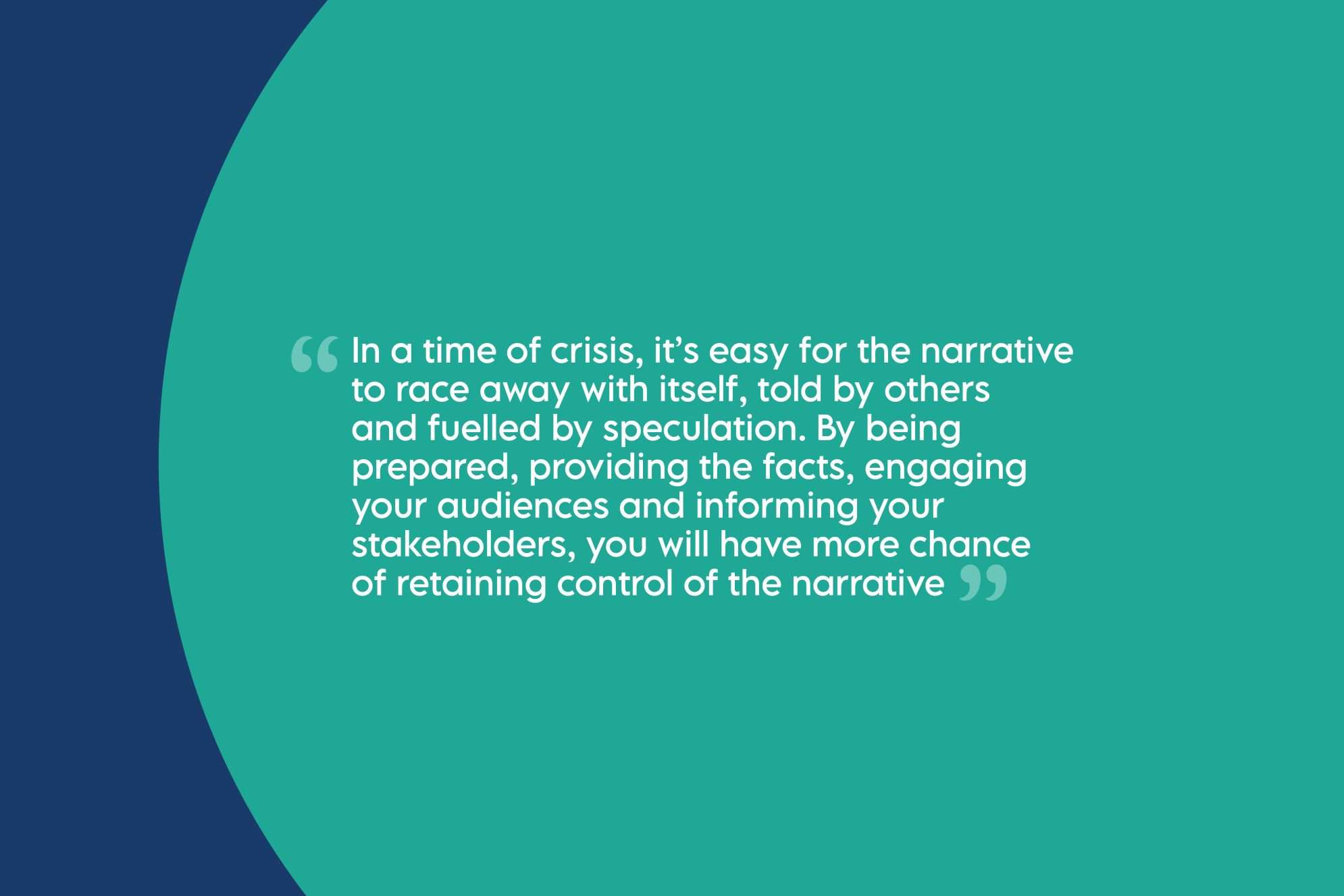
Forewarned is Forearmed: How to develop a crisis management plan
The way you respond during a crisis can have a huge bearing on your organisation’s reputation and the level of confidence it inspires among customers, staff and stakeholders.
By investing time and effort in developing a crisis communications plan, you can significantly reduce the risk to your organisation’s reputation and ensure that, when the worst happens, there is a clear and consistent roadmap to follow.
At the end of the day, you know your business better than anyone else. In a time of crisis, information and knowledge move at lightning speed, and it’s easy for the narrative to race away with itself, told by others and fuelled by speculation. By being prepared, providing the facts, signposting when new information will be provided, engaging your audiences and informing your stakeholders you will have more chance of retaining control of the narrative and emerging on the other side.
Crisis management plans come in all shapes and sizes, but the majority of effective plans will include the following elements:
- Defining a crisis
The dictionary definition of a crisis is “a difficult or dangerous situation,” which could describe anything from a below-average set of financial results to multiple fatalities at a company. Defining and categorising different potential crisis situations can help you plan a proportionate response and ensure the appropriate level of resources is available to call on. It can also shine a light on areas that could require additional planning and preparation.
- Identify your response team
Depending on the nature of the crisis, it is important to identify the key individuals responsible for putting the crisis management plan into action. This typically involves members of the senior management team, certain operational departments and, of course, members of the communications team. Be sure to consider alternative contacts who can deputise for those who are unavailable.
- Agree communications protocols
The first stage of a crisis response will almost always involve effective internal communications. Key decision-makers on the response team need to be quickly appraised of the facts, timeline and potential impact of the situation, while others in the organisation need to know where to direct any external enquiries. Clear direction on who should speak to the media, how to respond to negative comments on social media and how and when to brief key stakeholders is essential for an effective response.
- Mapping your stakeholders and channels
A crisis situation often requires timely, proactive communication with multiple audiences. Being able to quickly access an ‘oven-ready’ list of stakeholders, along with a matrix of preferred communication channels, is invaluable. The period just after a crisis arises is sometimes referred to as ‘The Golden Hour,’ when decisive action is paramount.
- Identify and train your key spokespeople
An organisation with confident spokespeople, who can communicate clearly and calmly during a crisis, is far more likely to emerge unscathed or with limited reputational damage. An effective media interview can go a long way toward de-escalating the situation and, importantly, portraying an organisation that is maintaining control and taking the necessary steps to address the causes and impact of the crisis.
- Assess your capability for monitoring and measuring a crisis
In the fast-paced world of digital communication, crisis management has become more challenging as difficult situations can quickly spiral out of control as rumour and misinformation is shared on social media. Organisations need to employ effective monitoring techniques, including social listening, to ensure the response team understands how communications are being received and interpreted.
- Test and refine your plan
A crisis management plan shouldn’t sit on a virtual office shelf gathering dust. It needs to be constantly reviewed, updated, be readily accessible, shared with new members of staff and tested regularly using ‘real life’ scenarios. The original plan should include a commitment to these ongoing practices.
- Beyond the moment
A crisis may emerge suddenly, but its duration and aftershocks can last a long time. Putting out the fire is only the first stage of a crisis, and planning and resources need to be put in place for managing its consequences. Ensuring the resilience and wellbeing of leaders, staff and customers should be a crucial consideration.
Freshwater’s experience in crisis management
We have extensive experience helping clients develop crisis communications plans, review existing plans and put response teams through their paces with scenario-based training. We also support clients to rebuild and recover, support involvement with inquiries, and sustain and, where necessary, restore confidence.
Below are a few examples of our work:
- Many NHS crises including strategic preparation and advice for the NHS inquiries into the Jimmy Savile sexual abuse scandal.
- Crisis management support to organisations dealing with high-profile child abuse cases
- Crisis management support around a number of mental health homicides.
- Media management and strategic counsel to the executive leadership of a further education college when a member of staff murdered another staff member.
If your organisation needs support in planning for a crisis, please email us at hello@freshwater.co.uk or call 029 20 30 40 50. Let us help you prepare, so you can respond with confidence when it matters most.
